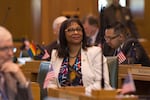One of the bill's chief sponsors, Rep. Janelle Bynum, D-Clackamas, was canvassing for reelection in a Portland suburb last summer when someone called the police on her.
It was one of many stories of cops being called on black people who were participating in their normal, everyday activities — from making a call from a hotel lobby to napping in a college dorm common area to barbecuing or mowing the lawn.
The legislation, which creates a pathway for someone to sue if they have had the police called on them for discriminatory reasons, passed on a 27-1 vote.

Rep. Janelle Bynum, D-Clackamas, attends an Oregon House session on Monday, April 29, 2019, in Salem.
Laurie Isola / OPB
The bill doesn’t create criminal charges, but it opens a pathway for people to file to small claims court for damages up to $250.
“When you get the cops called on you just for existing out in public, it sends a clear message: You don’t belong,” Bynum said in an email. “We have seen story after story where African Americans around the country have been targeted and had their rights violated.”
Sen. Jeff Manning, Jr., one of only two African American men in the state Senate, was also a police officer. He spoke in favor of the measure.
“Imagine what it felt like when the police rolled up on her,” Manning said of Bynum. “How that could have turned horribly wrong. We see it every day … . It’s unfortunate we even have to have a bill like this, but this is where we are at.”
Sen. Chuck Thomsen, R-Hood River, stood up to speak on the Senate floor to say police were once also called on him, a white older man.
Related: Oregon's Rep. Bynum On Race, Grace And Getting Stopped By The Police While Canvassing
“I hope this bill includes old, grey guys like me,” he said, saying the deputy sheriff showed up while he was campaigning and said, “Oh, Sen. Thomsen, that’s you.”
Sen. Lew Frederick, D-Portland, who is also African American, countered by saying it’s not simply an “inconvenience” when he gets stopped by the police.
“I don’t think some of my colleagues understand how fearful it can be … . I’ve said very simply when a police officer stops me, I wonder if I’m going to live the rest of the day. It’s a very direct, clear fear. Hard to get that across to my colleagues who don’t have that kind of fear,” Frederick said.
The only state Senator to vote against the measure was Sen. Alan Olsen, R-Canby, who said he’s worried what the bill could do to Neighborhood Watch programs since they might be afraid to make calls.
“It concerns me when we pass legislation that would stifle this group of folks protecting their neighborhood,” he said.
Bynum said she knows the measure won’t stop all racist or biased 911 calls.
“I wanted to spark a community conversation about how we make people feel welcome in our community and the danger that malicious 911 calls place on the lives of minorities,” she said. “I believe that this bill is an important part of that conversation, and will hopefully lead people to think carefully before calling the police.”
The bill now heads back to the House, which already passed the bill, for a tweak and then heads to the governor's desk.